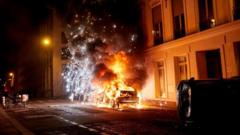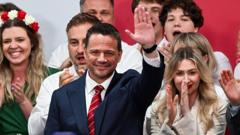In a closely watched run-off election, Ecuador's center-right President Daniel Noboa has declared victory, securing his position for a full four-year term with approximately 56% of the vote. Noboa, who took power in November 2023 following a snap election, has been characterized by his aggressive strategy to combat escalating gang violence, an issue that has plagued Ecuador and made it one of the most violent countries in the region. In the wake of his victory, opponent Luisa González has contested the results, alleging electoral fraud without providing substantiating evidence.
Ecuador's President Daniel Noboa Secures Second Term Amid Controversy

Ecuador's President Daniel Noboa Secures Second Term Amid Controversy
Ecuador's recent presidential election results reveal a significant split in the electorate, as President Daniel Noboa gains re-election despite allegations of fraud.
Election results from Ecuador's National Electoral Council indicate that Noboa's win is decisive, achieving a margin greater than ten percentage points and a lead of over one million votes. He described this outcome as "historic" and credited his administration's efforts and the perseverance of his supporters.
Moving forward, Noboa plans to continue his "war" against drug gangs, which includes militarizing the streets and prisons as well as constructing new high-security facilities. He has expressed interest in inviting foreign military support, including from U.S. and European forces, to bolster his campaign against organized crime. In addition to addressing security, Noboa aims to diversify Ecuador's energy generation by investing in renewable sources, as the country grapples with energy shortages.
Polls showed that security was the critical concern for voters, yet despite a slight drop in homicide rates during his administration, violence remains alarmingly high, emphasizing the challenging road ahead for Noboa. He will face pressure to demonstrate tangible reductions in violent crime and unemployment to quell public dissatisfaction.
After the election, González voiced her displeasure with the electoral process, accusing officials of undermining democracy and requesting a recount. However, without empirical evidence, it remains unclear whether her demands will be met. The outcome of this election leaves Ecuador deeply divided, with a significant portion of the electorate yearning for the economic stability they associate with the prior presidency of Rafael Correa.
As Noboa embarks on his newly elected term, maintaining unity in a polarized nation will be one of his primary hurdles, particularly as rivalries rooted in issues of governance and societal progress intensify.
Moving forward, Noboa plans to continue his "war" against drug gangs, which includes militarizing the streets and prisons as well as constructing new high-security facilities. He has expressed interest in inviting foreign military support, including from U.S. and European forces, to bolster his campaign against organized crime. In addition to addressing security, Noboa aims to diversify Ecuador's energy generation by investing in renewable sources, as the country grapples with energy shortages.
Polls showed that security was the critical concern for voters, yet despite a slight drop in homicide rates during his administration, violence remains alarmingly high, emphasizing the challenging road ahead for Noboa. He will face pressure to demonstrate tangible reductions in violent crime and unemployment to quell public dissatisfaction.
After the election, González voiced her displeasure with the electoral process, accusing officials of undermining democracy and requesting a recount. However, without empirical evidence, it remains unclear whether her demands will be met. The outcome of this election leaves Ecuador deeply divided, with a significant portion of the electorate yearning for the economic stability they associate with the prior presidency of Rafael Correa.
As Noboa embarks on his newly elected term, maintaining unity in a polarized nation will be one of his primary hurdles, particularly as rivalries rooted in issues of governance and societal progress intensify.






















